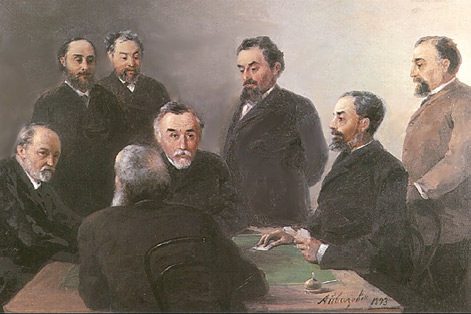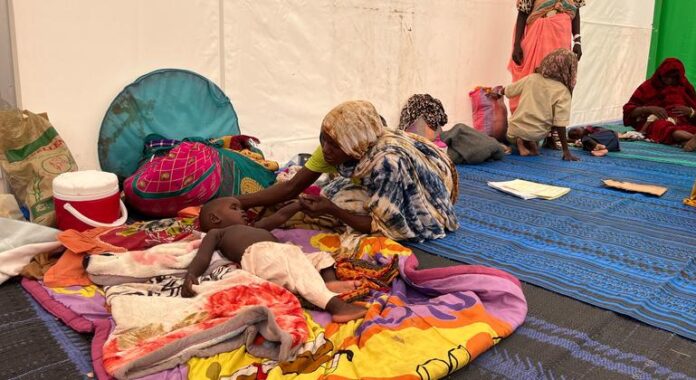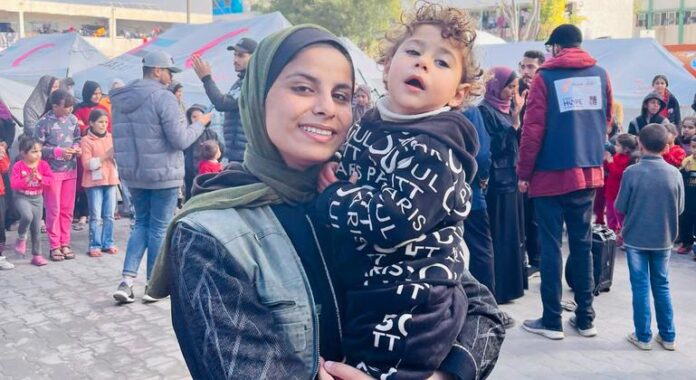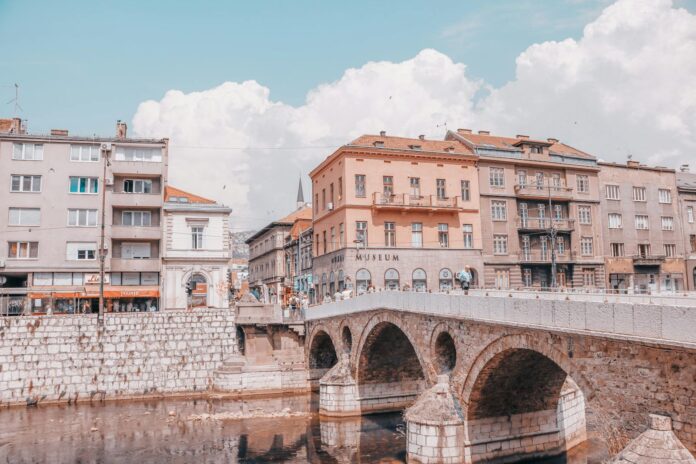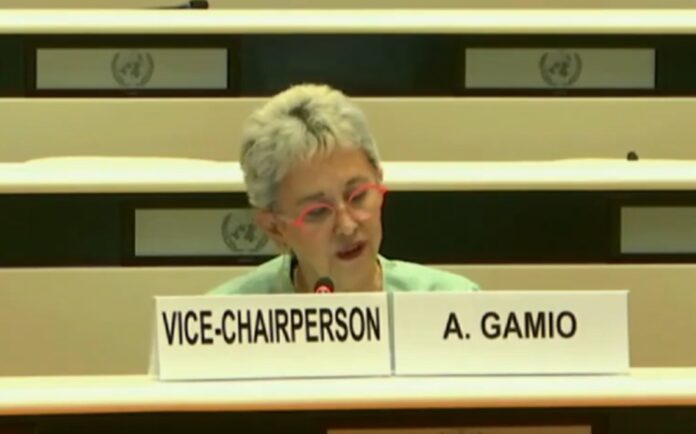Edem Wosornu of the UN humanitarian affairs office, OCHA, and Stephen Omollo, Assistant Executive Director of the World Food Programme (WFP), briefed ambassadors in the wake of the recent confirmation of famine in the Zamzam displacement camp, home to 500,000 people.
Zamzam is located near El Fasher, capital of North Darfur state, and the Famine Review Committee also found that famine conditions are also likely present in other camps in and around the city.
We have failed
“This announcement should stop all of us cold because when famine happens, it means we are too late. It means we did not do enough. It means we, the international community, have failed. This is an entirely man-made crisis and a shameful stain on our collective conscience,” said Ms. Wosornu, OCHA’s Director of Operations and Advocacy.
She recalled that humanitarians had warned the Council about the risk of famine and widespread insecurity back in March and continued to sound the alarm in subsequent briefings.
“Let me be clear: It is still possible to stop this freight train of suffering that is charging through Sudan. But only if we respond with the urgency that this moment demands,” she insisted.
‘A quagmire of violence’
The Sudanese National Army and a rival, formerly-allied military, known as the Rapid Support Forces (RSF), have been battling since April 2023, pushing “millions of civilians into a quagmire of violence and with it, death, injury and inhumane suffering treatment.”
A staggering 26 million people are facing acute hunger, which Ms. Wosornu said is equivalent to “New York times three – full of starving families and malnourished children.” More than 10 million people have been forced to flee their homes, including some 726,000 displaced from Sennar state following recent RSF advances.
Sudan’s once vibrant capital, Khartoum, now lies in ruins, the national healthcare system has collapsed, and recent heavy rains in Kassala and North Darfur have increased the risk of cholera and other waterborne diseases. An entire generation of children is missing out on a second straight year of education.
Concern for rape survivors
Ms. Wosornu also voiced grave concern over war crimes, with women and girls worst affected.
“Since our last briefing, new reports have revealed horrific levels of conflict-related sexual violence in Khartoum targeting girls as young as nine years old,” she said.
“Access to emergency healthcare and gender-based violence services is shrinking. Suicide rates among survivors is increasing. The number of children born out of rape surging.”
Expanding aid operations
Despite the dire situation, humanitarian agencies and their local partners continue to deliver life-saving assistance in Sudan and are expanding their “operational footprint” in areas where food insecurity is most acute.
They are “exploring every possible avenue to reach communities affected, including through airlifts”, she said, which requires receiving the necessary permissions to access airstrips.
Humanitarians also plan to distribute more than $100 million in cash and voucher assistance by the end of the year in areas where markets are functioning. Other activities include providing seeds and other support to farmers.
Access and resources
“In short, we are pushing from every possible angle to stop this catastrophe from getting worse, but we cannot go very far without the access and resources we need,” she said.
At the same time, aid workers continue to be harassed, attacked and killed, while convoys transporting food, medicine and fuel have been subjected to looting, extortion and obstruction.
She said three trucks carrying therapeutic food have been blocked by the RSF for over a month in Kabkabiya, located west of El Fasher, thus “depriving malnourished children in Zamzam camp of assistance they desperately need to survive.”
‘Assistance delayed is assistance denied’
Furthermore, the recent escalation in Sennar has cut off the main southern crossline route for aid delivery from the coastal city of Port Sudan to Kordofan and Darfur. Access via the northern route, through Ad Dabbah, has been intermittent due to conflict, insecurity, obstruction and delayed permissions.
“Lifesaving supplies in Port Sudan are ready to be loaded and dispatched to ZamZam, including essential medicines, nutritional supplies, water purification, tablets and soap. It is crucial that the approvals and security assurances needed are not delayed,” she stressed.
Additionally, relief supplies for the camp are also readily available in eastern Chad, but heavy rains have flooded the Tine crossing – the only cross-border route open to humanitarians after the Sudanese authorities revoked permission for the use of Adre crossing in February.
She said Adre – with its tarmac roads and shorter distance to Darfur – would be the most effective route for delivering the large volumes of aid needed at this critical moment.
“Assistance delayed is assistance denied for the many Sudanese civilians who are literally dying of hunger during the time it takes for clearances to come through, permits to be granted and flood waters to subside,” she warned.
Four key demands
Ms. Wosurno reiterated the humanitarian community’s four main asks for the Council, starting with ending the conflict.
She also called on the warring sides to uphold their obligations under international law, and for rapid, safe and unimpeded humanitarian access across all possible routes.
“Given the massive hunger crisis unfolding in North Darfur and other parts of the country, we need to reach people now – across borders, across battle lines, by air, by land,” she stressed.
She also highlighted the need for adequate funding to support aid operations. A $2.7 billion appeal for Sudan, launched earlier this year, has so far received $874 million, or just over 30 per cent of the money needed.
‘A wake-up call for the international community’
Mr. Omollo also reminded ambassadors that for months, WFP and other humanitarian agencies have been warning of a widespread collapse in food security in Sudan.
“Conditions throughout Sudan are appalling, and getting worse by the day,” he said. “This forgotten crisis has not received the political and diplomatic attention it desperately needs. Yet it has wider implications and threatens to destabilize the wider region.”
Therefore, the famine confirmation “must serve as a wake-up call for the international community, and for members of this Council.”
He appealed for coordinated diplomatic efforts to address the widespread operational challenges and impediments that aid agencies are confronting.
Meanwhile, WFP are significantly scaling-up operations to curb the spread of famine, including by providing a mix of in-kind food assistance, cash and local procurement, when feasible.
The UN agency aims to substantially increase the number of people it serves in Sudan, while also supporting refugees who have fled to Chad, South Sudan, Libya and other neighbouring countries.
“Humanitarian agencies will do everything we can to prevent famine from engulfing Sudan. But we can only operate where conditions allow, and where we are granted access,” he said.
“Now more than ever, we need the Security Council to focus on this crisis, and use its influence on the warring parties to halt the conflict that is tearing Sudan apart.




